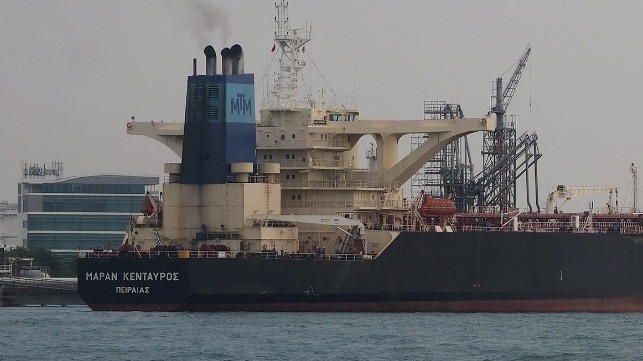Shipbreaking Worker's Widow Brings Case Against UK Shipowner

London's High Court has ruled that the widow of a Bangladeshi shipbreaking worker may proceed with a suit against the original owner of the vessel on which he died.
The deceased, 32-year-old Khalil Mollah, fell to his death in 2018 while breaking up the tanker Maran Centaurus on the beach in Chittagong, Bangladesh. Mollah's widow, Hamida Begum, sued former owner Maran (UK) Ltd. in April 2019, asserting that the firm bore liability for her husband's passing. Begum alleges that a Maran (UK) subsidiary played a role in the vessel's sale to a breaker in Bangladesh, where working conditions are known to be dangerous, and that the vessel's subsequent demolition led to her husband's death.
According to Begum's complaint, a Maran subsidiary sold the Maran Centaurus to Nevis-based firm Hsejar Maritime Inc. and received a $16 million payment from a different entity, leading cash buyer Wirana Shipping. Under Hsejar's ownership, the vessel was renamed Ekta, reflagged in Palau and sailed to Chittagong with a new crew. The following year, while dismantling it on the beach, Khalil Mollah fell from a height and was fatally injured.
Begum's suit contends that based upon the high price per ton paid and the amount of fuel left in the Maran Centaurus' tanks at the time of handover, the former owner's subsidiary must have been aware of its ultimate destination - Bangladesh - even though they did not transact directly with the shipbreaker. Chinese or Turkish breakers did not generally pay prices in the range of $400 per net long ton at the time of the contract signing. The suit contends that Maran (UK) had a duty of care to ensure that the vessel was disposed of safely and that it was negligent in its exercise of this duty. The suit also contends that the sale resulted in environmental harm.
In his ruling, High Court Justice Jay dismissed the idea that the sale of ships to South Asian shipbreakers is defensible by means of its popularity. The defendant's counsel argued that since only a minute fraction of the world's oil tankers were broken up in Chinese and Turkish yards in 2017, the transaction had not deviated from standard practice. "I reject that submission on the straightforward basis that if standard practice was inherently dangerous, it cannot be condoned as sound and rational even though almost everybody does the same. I also reject any suggestion that South Asia was the only option as a matter of practical reality," Justice Jay concluded.
The judge ruled that based upon the evidence at hand, elements of the claim have a reasonable chance of success at trial at a UK court, and he permitted it to move forward.
“The judgment handed down today is a great relief to our client, who has suffered not only the loss of her husband, but of her security and livelihood," said Oliver Holland, partner at law firm Leigh Day, which represented Begum. “If Maran (UK) Ltd is made to accept that it owed Mr Khalil Mollah a duty of care, maybe that will go some way to making UK shipping companies think twice about accepting greater financial reward for their end-of-life vessels at the cost of the environment and the lives of South Asian workers.”
